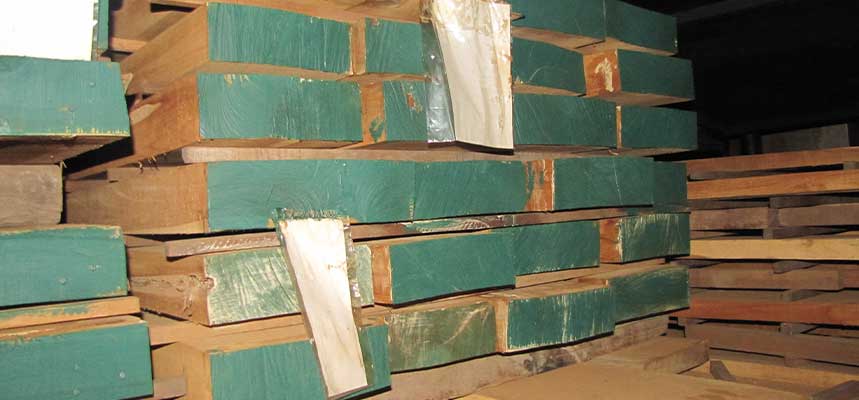After the rather rough visit from Mother Nature to our Plantation in Sierpe this past August, we decided to take advantage of the situation presented by the storm and walk you through our production process, which is divided into 3 internal ‘MysTEAK’ sections; growth (Plantations), production (Creations), and sales (Designs).
We showed to you in our last blog the physical and logistical work necessary for recovery on the plantations from the storm. To protect the fallen trees from pests, we worked hard to identify, cut and extract the trees using traditional means. This process highlights the Mys-TEAK Plantations phase.
The next phase is production, which is everything from the moment the wood arrives at the mill to when the container is ready to set sail for Canada. Once the logs arrive at the sawmill, we initiate the milling process by applying wax to the ends of each log. This helps to avoid splitting of the log ends by slowing the drying process. With our commitment to being environmentally conscious wherever possible, we do not use strong fumigation or pesticides to control wood boring bugs. With that in mind, it’s imperative that through every process, we have strong coordination and organization to ensure the end product is of superior quality and is without defects.
From here, we organize and select the logs to initiate milling. As the thicker planks need more time to dry, we try to mill them first, but this is not a mandatory rule nor is it always possible. Many of our trees will produce big pieces even when that is not what we want. During the primary milling process the sawyer has an important responsibility that is gained through multiple years of experience. That responsibility is to get the best pieces possible from every log based on quality, size and specific order requests. It Is here where the initial lumber grading occurs.
The milling continues for weeks just to complete one container load. The next step is especially important as the milled lumber is moved into waiting kiln rooms so we can begin the drying process. To ensure excellent adaptation from humid Costa Rica to the dry Canadian winters, we ensure kiln drying is 10% or less in the core of the lumber. This can be hard to achieve in the extremely humid environment of Costa Rica.
Once the logs are removed from the kiln, speed is of the essence in getting the wood packaged and shipped before significant reabsorption occurs. Failure to properly dry the wood can result in cracking, checking, splitting, warping and potential for fungal growth on the wood surface.
After kiln drying, we heat treat the wood to ensure there is no possibility of pests and to obtain Government of Costa Rica certification of the treatment process. From here, we start the secondary milling process where we take pre-selected lumber to process specific orders into flooring (max 7% humidity), decking, garden furniture, or simply planing and edging boards to reduce shipping space. Then we move to the final phase of squaring all board ends, packing, re-sorting, inventory, final grading, palletizing, and creating the exportation documents and shipping manifests. Forty-eight hours before the ship sails a container will arrive at the mill and the loading or “container stuffing” starts. The pallets must be designed with the container dimensions in mind or there will be a tremendous waste of space. As well, when loading the container we must consider weight, stability, and proper security of the product inside each container.
Like every refined, elegant product in life, supplying high quality plantation teak requires careful planning as well as attention to detail to ensure that durability and beauty will be apparent to all. Excellence at Mys-TEAK is a core value which began many years ago with the decision to invest in Costa Rica, the “jewel” of Central America. Our passion for responsible high-quality tree growth and exceptional attention to detail in our milling and production is supported by our carefully designed grading system, all found exclusively at Mys-TEAK.
Give us a call if you would like to learn more about teak, growing and production of teak, grading or would like to discuss project ideas with us! We are happy to help!

